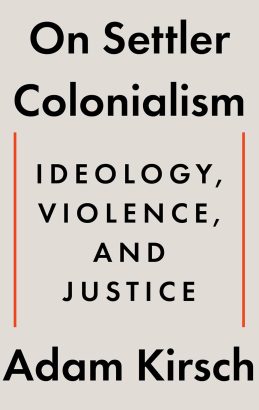Palestine is Everywhere
‘Palestine is everywhere’ proclaimed a window-sign I saw on a recent visit to Brooklyn. What could this possibly mean? As a matter of geography, it is obviously incorrect — Palestine is not everywhere; it is in the southern Levant. But I sensed (correctly) that the slogan was not a claim about geography or politics, but rather about metaphysics, even theology: Palestine may be territory in the Middle East, but the dynamic of the Palestine/Israel conflict is a universal one of colonisation and oppression. For many activists, ‘Palestine’ is not a local or even regional conflict between ethno-religious groups over borders, sovereignty, competing national narratives and historic claims, or over land or resources. Rather, it is seen as a cosmic battle between the forces of darkness and the forces of light who struggle for nothing less than the redemption of humanity. As one pro-Palestinian website, Jadaliyya, has it:
Because Palestine is everywhere, freedom fighters, martyrs, lovers, healers, and dreamers are everywhere. Our desire for freedom is a planetary struggle beyond the nation state. Nation states are our prisons. We must be free of them and their property laws. When we chant and hear Free Palestine we are imagining a world that does not think of land, water, and air as private property and settlements, but as relations to care for’
Leaving aside the curiosity that a global struggle against nation states targets only one nation state for elimination, what could it mean for a local conflict involving a tiny fraction of the world’s population to be the key to unlocking a universal transformation of all human relationships? And how could this claim gain widespread intellectual and popular currency? Adam Kirsch, an editor at the Wall Street Journal, seeks answers to these and other questions in his slender, eloquent volume On Settler Colonialism: Ideology, Violence, and Justice.
Kirsch begins with a review of the academic literature of settler colonial ideology (‘SCI’) as it developed in universities before spreading to mainstream discourse. One of SCI’s key tenets is the redefinition of colonisation from a historical event (or series of events) to an ongoing offense, and even an existential state of being. As the SCI scholar Patrick Wolfe succinctly stated: ‘Invasion is a structure, not an event.’ In the American context, for example, this means that while the colonial era technically ended in 1783 with British recognition of American independence, the structure of colonisation by which Europeans killed and replaced natives remains in place and continues to shape American society in profoundly unjust ways. And contemporary Americans (Natives excepted, of course) are morally tainted by our participation in, and collaboration with, the structural injustice of settler colonialism, merely by living in the settler colony of the United States.
A second move that SCI makes is to expand the list of harms for which settler colonialism is responsible from the obvious damage to indigenous societies and culture to include virtually every social injustice imaginable, such as racism, environmental degradation, homophobia, capitalism, sexism and economic inequality. (The fact that non-colonial societies also struggle with these plagues seems not to faze SCI theorists.)
Although he is deeply and justifiably critical of SCI, Kirsch acknowledges that it is rooted in laudable moral indignation at the suffering of indigenous populations subjected to displacement and genocide at the hands of European settlers. The problem, Kirsch argues, is that SCI offers indigenous people little or nothing in terms of practical measures that would ameliorate their current conditions. Proponents of the SCI often seem more concerned with ideological purity and performative rituals than with practical politics. This likely explains the limited appeal of SCI to Natives themselves, who are understandably less concerned with expiating settlers’ guilty consciences than with employment, education, healthcare and other worldly concerns. (Have you noticed that land acknowledgements are never followed-up with a commitment to return the stolen land, or even to financially support Native charities?
Having established (at least on its own terms) the fundamental illegitimacy of settler colonial societies, SCI runs up against the stark reality that the clock cannot be turned back — Western societies such as Canada, Australia and the USA cannot be decolonised because the genocide was too thorough. There are just too few Natives and too many settlers. This leads SCI theorists to two very strange places, both fantastical: one relatively innocuous; the other potentially lethal.
Confronted with the seemingly unalterable reality of settler colonial Western societies, SCI does what previous radical ideologies have done when pressed for details about their imagined utopias: it retreats into magical, quasi-mystical thinking about what postcolonial societies might become. Like orthodox Jews imagining the messianic age, fundamentalist Christians dreaming of the Second Coming, or dogmatic Marxists longing for a classless society, SCI theorists spout lovely-sounding but meaningless jargon (‘relinquishing settler futurity’) and chastise unbelievers for their lack of faith.
The Controversy of Zion
But while fantasies of the decolonisation of Western societies are comparatively harmless, SCI takes a darker turn when it turns its gaze eastward. Applying the settler colonial paradigm to the conflict in the Middle East, SCI flattens Israeli-Jewish and Palestinian-Arab identities into the binary categories of ‘settler’ and ‘indigenous,’ respectively, and presents the conflict between them as essentially a cowboys and Indians movie, albeit with the traditional moral sympathies inverted. This flattening is both untrue to the history and identity of both peoples, and positively harmful because the Palestinians’ belief that they are engaged in an anti-colonial struggle condemns both sides to unending bloodshed.
To be fair, Zionists and supporters of Israel must concede that Palestinians experienced Zionism as something akin to colonisation. At the beginning of the Zionist movement in the late Nineteenth Century, the land that became the British Mandate for Palestine was overwhelmingly Arab, though there had been a continuous Jewish presence there for millennia. Over the course of the ensuing decades, thousands arrived from Europe, seeking to transform the land demographically, politically, and even physically. From the perspective of the Arabs, these people were foreigners who spoke strange languages, wore strange clothing, and — after 1917 — were partnered with the world’s largest empire.
But this is only part of the story. Zionism differs from settler colonialism in obvious ways, the most important of which is that Jews are not foreign to Israel as Europeans were foreign to North America and Oceania. No matter how much anti-Zionists deny it, it is an incontrovertible historical fact that the land of Israel is the indigenous homeland of the Jewish People: the place where their story begins, where they first achieved sovereignty, where they wrote their sacred texts, where they face during prayer, where the Jewish religion and Hebrew language were born, and from which the Jews were exiled after losing a series of wars to a powerful empire. Jews, therefore, experience Zionism as decolonisation — the restoration of an indigenous people to its historic homeland.
In the early decades of Jewish settlement, Palestinian Arabs’ incorrect belief that the Jews were merely colonisers, however incorrect, was understandable — even reasonable — given the Arabs’ unhappy history of encounters with European empires. By this point, however, the refusal to acknowledge the profound, millennia-long connection of the Jewish people to the land of Israel seems willful, not merely ignorant.
Furthermore, Jews did not come to Israel as agents of a foreign empire. Some came as idealists seeking to rebuild an ancient homeland, but the vast majority came as refugees (from Europe, the Middle East, Ethiopia, and Russia) with no other place in the world to go. This is the key point — and one that has also been made so eloquently by Haviv Rettig Gur. Anti-colonial struggles can be won — when the colonisers are subjected to sufficient violence and suffering, they return to their mother countries. But Israeli Jews, Kirsch explains, because they have no where to which to return, ‘will fight for their country, not like the French in Algeria or Vietnam, but like the Algerians and Vietnamese.’ (Citation p. 109)
The Palestinians’ tragically mistaken belief that they are engaged in an anti-colonial struggle in which the Jews can be driven out by sufficient violence and cruelty, leads them to eschew political compromise, and to debase themselves through acts of barbarity such as were seen on October 7. That this fantasy is now indulged — nay, sanctified — by Western intellectuals and on college campuses, is a tragedy for the region and the world, but not least for the Palestinians themselves.
True allies of the Palestinians would seek to disabuse them of this notion, educate them about the indigenous story of the Jewish people, and lead them toward a peaceful division and sharing of the land. With a more realistic understanding of who the Israeli Jews are, Palestinians could have turned their considerable talents toward building a prosperous society in Gaza, rather than turning it into a fortress from which to ‘decolonise’ Israel. And Gaza today might look more like Cancun or Dubai than the post-apocalyptic hellscape it has become.
Old Wine in New Wineskins
As world history played out, the myths and legends of one small seemingly-insignificant little kingdom on the Eastern Mediterranean became the universal story of much of humanity (and this universalisation and appropriation of the Jewish story is now being recapitulated through the universal technology of the Internet). The nation that authored those legends, and whose early history was recounted in them, assumed a theological significance in the narratives of the two great religions that appropriated them. On a very deep level, Jewish sovereignty in the ancient Jewish homeland disrupts (or at least challenges) the master narratives of both Christianity and Islam.
Supposedly, Martin Luther once joked that if the Jews ever regained sovereignty over the Land of Israel, he would convert to Judaism. Leaving aside the implausible notion that a German once told a joke (that’s a joke by the way), the anecdote is revealing. For Luther, as for so many of the early Church Fathers, the exile of the Jews from their ancient homeland confirmed the validity of the Christian story — the Jews rejected their Messiah and suffered the divinely-ordained consequences: exile and persecution.
For Islam, the geopolitical expansion of the Muslim empire in its early centuries confirmed of the truth (and superiority) of Mohammad’s revelation. As the Quran states: ‘Do [the non-Muslims] not see that We gradually reduce their land from its borders. God decides — none can reverse his decision.’ (13:41).
Thankfully, most Christians no longer reject Zionism on theological grounds. And there are even divergent interpretations of Islam that are compatible with Jewish sovereignty in Israel (see e.g. Mansour Abbas), though these remain marginal. But Jewish sovereignty over Israel touches a very deep cultural, historical, and theological nerve, in a way that Armenian or Laotian self-determination does not.
One of Kirsch’s most interesting arguments is his claim that SCI bears uncanny resemblances to Calvinism (ironically the religion of the Puritans, i.e. the original settler colonialists). Colonisation, in this schema, becomes an original sin which is passed down through the generations, and which we can never overcome through our own efforts. Only by confessing our sin and acknowledging our fallenness can we begin to receive salvation:
We in the West are steeped in sin — the original sin of settler colonisation — in which we are all complicit, and which is the sole source of all injustice in our society. Alas, America cannot be decolonised; for the wages of sin is death. But wait! All is not lost! There is one (Jewish) nation that can bear the sin of the world, and by its gruesome, bloody death bring redemption to us all. As a well-known Second Temple rabbi might have put it, this is (very) old wine poured into a new wineskin.
Ideas Matter
If the long and tortured history of the Jewish people has proven one principle, it is this: Ideas matter. They have consequences. An entire generation of Germans was raised on an ideology of race and nationalism that led them to conclude that the mass murder of Jews was a moral imperative. A century later, a generation of young Americans is being fed an ideology of race and ‘colonialism’ that is leading them down the same moral abyss. Last autumn witnessed the sorry spectacle of many Western students and intellectuals celebrating mass murder, torture and rape. And a poll conducted last December found that a majority of college-age Americans believe that the political grievances of Palestinians are sufficient to justify a genocide of Israeli Jews.
Adam Kirsch has penned a learned and eloquent evisceration of this toxic ideology. But can the voice of reasoned, rational discourse be heard above the shouting of crowds, the explosions of bombs, and the crying of innocents — and through the polarising echo chambers of social media? That remains to be seen.




































